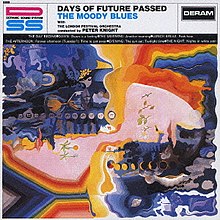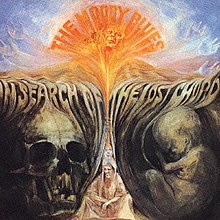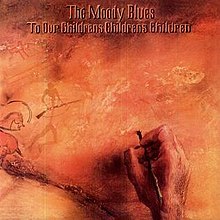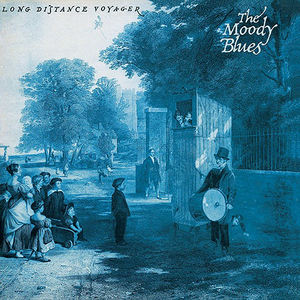The Moody Blues were the band that exposed me to what later became known as progressive rock. Back in the early 70s when I first heard their records, I was but a small lad whose musical tastes centered on what was on top 40 radio. It was also a time when I was strangely obsessed with the music of the Beach Boys — but that’s another Mix Six for another time. You know how they say older siblings or even parents often shape one’s musical tastes? Well, when it came to the Moody Blues, the answer is both. My mother, step dad, and oldest brother were quite taken by the Moodies and consequently their records were often the ones that were on high rotation on the record console in my house. So what that means is when a few people in the house have a bit of a monopoly over the stereo, you just surrender to what’s on and enjoy the ride. Thankfully, the Moody Blues’ music was something I found interesting (even as a young boy). They had long, trippy songs, poems, hard rocking tunes, love songs, and even symphonic embellishments. It was a kind of one stop shop band where you could get many musical styles on any given album.
When putting this mix together, I quickly realized that I was a ”core seven” kind of guy. That is to say, I was never really into the Moodies when they were an R&B band, nor did I really connect with their music after Long Distance Voyager. After 1981, Justin Hayward and John Lodge took over as the primary songwriters, and the Moody Blues’ music lost whatever psychedelic edge they had cultivated from 1967-1972 in favor of a softer, more adult contemporary sound.

”Sunset” (Download)
Michael Pinder was an integral member of the band, and his influence on the more trippy/psychedelic/prog songs is very evident on ”Sunset.” Taken from their second album, Days of Future Passed, ”Sunset” fuses symphonic, Indian and Middle Eastern musical flourishes in a spare, but effective way.

”The Word/Om” (Download)
As I wrote in the outset, the Moody Blues often included spoken word poetry, and on In Search of the Lost Chord the band really reflected the infatuation some British rockers had with Hinduism. Justin Hayward played the sitar on ”Om” (as well as ”Sunset”), and he does a wonderful job of adding a nice base layer so Ray Thomas’ flute playing and the band’s harmonizing could shine.

”Higher and Higher” (Download)
When I was a kid, the Apollo program transfixed me — and the Moody Blues, too. ”Higher and Higher” somewhat gets beyond the mysticism the band explored on their earlier albums and is a sort of paean to space flight and what humankind could create with science and technology. That’s not to say that the band wasn’t skeptical about modernism (a recurring theme in some rock music of this era), but if you were alive when humans were walking on the moon, it was hard to be anything but amazed by what us mere mortals accomplished.

”In the Beginning/Lovely to See You” (Download)
I’m skipping the chronology of the albums here, but ”In the Beginning” really captures the sense of alienation from the modern world that many boomers were reacting to. You certainly hear it in the questioning of the first character, the overbearing computerized voice of the second character, and the third character who implores the first not to give in to a soulless culture. ”Lovely to See You” is classic Justin Hayward: a pretty song steeped in themes of love and deep connection. And, lest I forget, his killer guitar work.

”And the Tide Rushes In” (Download)
Ray Thomas has retired from the band, but he often wrote some really fine love songs that were deeply introspective, and diversified the band’s sound in such a way that they couldn’t be pigeonholed only as a psychedelic band.

”Isn’t Life Strange” (Download)
John Lodge’s songs explore similar themes as Hayward’s (usually love), but unlike his counterpart, his songs often have odd vocal phrasings that can be a bit darker. I was surprised that this song was a released as a single back in 1972. If I were an A&R guy, I don’t think I would have picked this as a single for radio play, but it peaked at number 23 on the Billboard Hot 100 that year. Go figure.

”The Story in Your Eyes” (Download)
Another Justin Hayward classic! With the opening guitar riff, his velvety vocals, the earnest lyrics, and the background vocals from the entire group, it’s pretty clear why he eventually became the de facto leader of the band: his songs were the most radio-friendly.

”Veteran Cosmic Rocker” (Download)
Because the Moody Blues have had more chart success with the Hayward/Lodge songs than those by Pinder, Thomas and Edge, I wanted to feature more songs by the latter than the former. I feel the combination (and contributions) of all the band members made the Moody Blues a wonderfully diverse group who produced seven amazing albums — and then kind of drifted into a much more mellow (and less adventurous) sound that certainly produced hits for them, but lacked the spirit of their progressive rock days. ”Veteran Cosmic Rocker” contains musical elements from their early days, but Thomas’ lyrics signal that while the group was still making music, their sound and their spirit would eventually die. Alas, Ray Thomas was right.





Comments